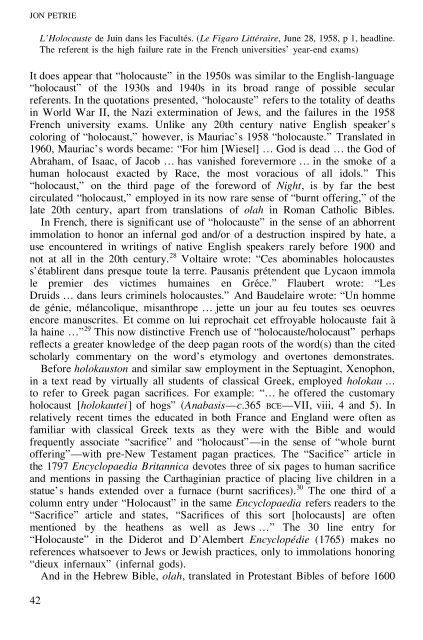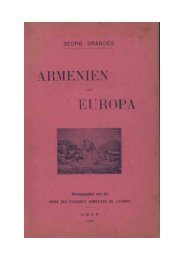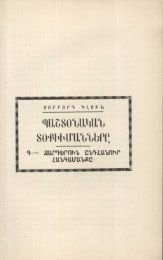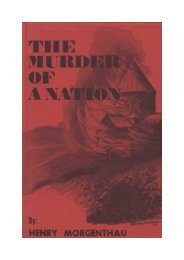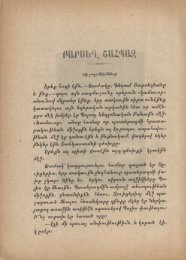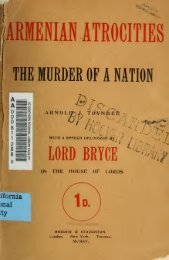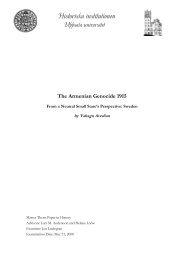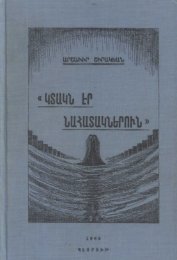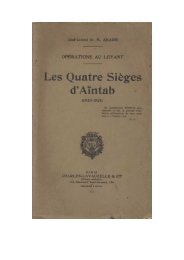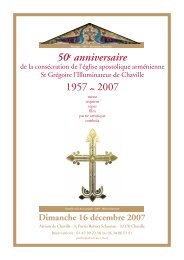The secular word HOLOCAUST: scholarly myths, history, and 20th ...
The secular word HOLOCAUST: scholarly myths, history, and 20th ...
The secular word HOLOCAUST: scholarly myths, history, and 20th ...
Create successful ePaper yourself
Turn your PDF publications into a flip-book with our unique Google optimized e-Paper software.
JON PETRIEL’Holocauste de Juin dans les Facultés. (Le Figaro Littéraire, June 28, 1958, p 1, headline.<strong>The</strong> referent is the high failure rate in the French universities’ year-end exams)It does appear that “holocauste” in the 1950s was similar to the English-language“holocaust” of the 1930s <strong>and</strong> 1940s in its broad range of possible <strong>secular</strong>referents. In the quotations presented, “holocauste” refers to the totality of deathsin World War II, the Nazi extermination of Jews, <strong>and</strong> the failures in the 1958French university exams. Unlike any <strong>20th</strong> century native English speaker’scoloring of “holocaust,” however, is Mauriac’s 1958 “holocauste.” Translated in1960, Mauriac’s <strong>word</strong>s became: “For him [Wiesel] … God is dead … the God ofAbraham, of Isaac, of Jacob … has vanished forevermore … in the smoke of ahuman holocaust exacted by Race, the most voracious of all idols.” This“holocaust,” on the third page of the fore<strong>word</strong> of Night, is by far the bestcirculated “holocaust,” employed in its now rare sense of “burnt offering,” of thelate <strong>20th</strong> century, apart from translations of olah in Roman Catholic Bibles.In French, there is signi cant use of “holocauste” in the sense of an abhorrentimmolation to honor an infernal god <strong>and</strong>/or of a destruction inspired by hate, ause encountered in writings of native English speakers rarely before 1900 <strong>and</strong>not at all in the <strong>20th</strong> century. 28 Voltaire wrote: “Ces abominables holocaustess’établirent dans presque toute la terre. Pausanis prétendent que Lycaon immolale premier des victimes humaines en Gréce.” Flaubert wrote: “LesDruids … dans leurs criminels holocaustes.” And Baudelaire wrote: “Un hommede génie, mélancolique, misanthrope … jette un jour au feu toutes ses oeuvresencore manuscrites. Et comme on lui reprochait cet effroyable holocauste fait àla haine …” 29 This now distinctive French use of “holocauste/holocaust” perhapsre ects a greater knowledge of the deep pagan roots of the <strong>word</strong>(s) than the cited<strong>scholarly</strong> commentary on the <strong>word</strong>’s etymology <strong>and</strong> overtones demonstrates.Before holokauston <strong>and</strong> similar saw employment in the Septuagint, Xenophon,in a text read by virtually all students of classical Greek, employed holokau …to refer to Greek pagan sacri ces. For example: “… he offered the customaryholocaust [holokautei] of hogs” (Anabasis—c.365 BCE—VII, viii, 4 <strong>and</strong> 5). Inrelatively recent times the educated in both France <strong>and</strong> Engl<strong>and</strong> were often asfamiliar with classical Greek texts as they were with the Bible <strong>and</strong> wouldfrequently associate “sacri ce” <strong>and</strong> “holocaust”—in the sense of “whole burntoffering”—with pre-New Testament pagan practices. <strong>The</strong> “Saci ce” article inthe 1797 Encyclopaedia Britannica devotes three of six pages to human sacri ce<strong>and</strong> mentions in passing the Carthaginian practice of placing live children in astatue’s h<strong>and</strong>s extended over a furnace (burnt sacri ces). 30 <strong>The</strong> one third of acolumn entry under “Holocaust” in the same Encyclopaedia refers readers to the“Sacri ce” article <strong>and</strong> states, “Sacri ces of this sort [holocausts] are oftenmentioned by the heathens as well as Jews …” <strong>The</strong> 30 line entry for“Holocauste” in the Diderot <strong>and</strong> D’Alembert Encyclopédie (1765) makes noreferences whatsoever to Jews or Jewish practices, only to immolations honoring“dieux infernaux” (infernal gods).And in the Hebrew Bible, olah, translated in Protestant Bibles of before 160042


